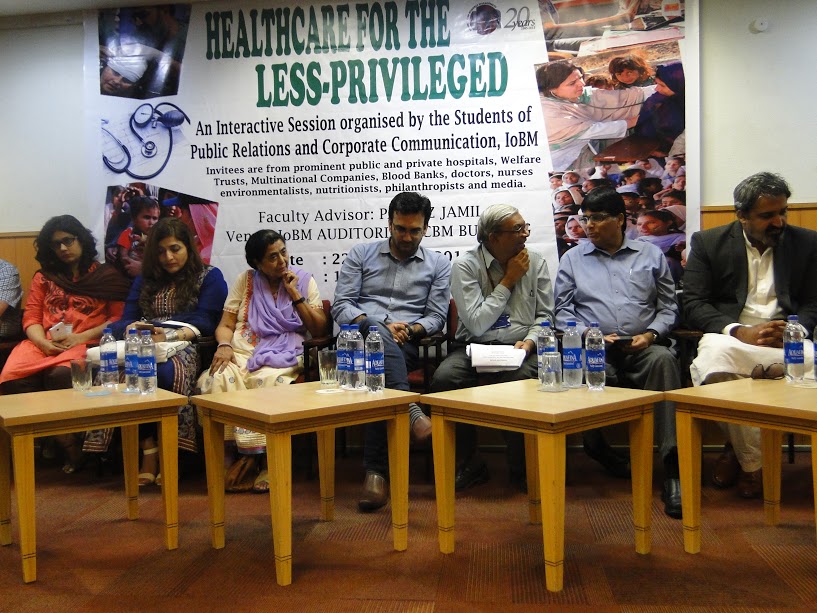Pakistan’s healthcare imitates unequal access to health facilities, inadequate allocation for health, high population growth, infant mortality, poverty and malnutrition. Students of Public Relations and Corporate Communication.

Pakistan’s healthcare imitates unequal access to health facilities, inadequate allocation for health, high population growth, infant mortality, poverty and malnutrition. Students of Public Relations and Corporate Communication.
IoBM organized an event, titled ‘Healthcare for the Less-Privileged’. It was attended by CEOs, directors, managers, doctors and healthcare professionals from hospitals, pharmaceutical companies, NGOs, private and the public sector. Renowned environmentalists, nutritionists, and public figures from welfare trusts, blood banks and Youth Parliament were also among the guests. A large number of students, faculty and administrative staff were drawn to this event.
Mr. Talib Karim Rector, IoBM acknowledged the inspiring presence of a galaxy of health luminaries and elucidated upon how IoBM contributes to education in business management and allied disciplines, including a well-established Health and Hospital Management Program. Dr Anwar Naqvi of SIUT appreciated the efforts of the IoBM students for organising a purposeful event. He gave an overview on healthcare in Pakistan and the stupendous contribution made by SIUT for this cause for the last 44 years.
Mr Asad Gondal of Reckitt Benckiser pharmaceutical discussed the sustainability in providing consistent healthcare facilities to the less-privileged of the country, which goes beyond the concept of CSR and charity. He said RB introduced their Project HOPE, which empowers women to educate the families of their areas the proper hygiene and healthcare procedures and enable them to fight against diarrhea.
National Media policy on Healthcare for the Less-Privileged, a significant discovery point of this entire session, was brought forward by a faculty of IoBM, Mr. Parvez Jamil. This policy would enable the lower segment of the society an effective, quick, and cost free access to qualified doctors’ consultancy. As healthcare is very expensive and not affordable to masses, this policy would allow them to receive free of charge medical consultancy through radio, newspaper, and television in the form of live shows, radio discussions, and news articles. This will not be a onetime event rather a properly planned and organized project for a prolong duration that facilitates healthcare for the less-privileged.
Mr. Sharif Hashmani of the Hashmani Eye Hospital informed how Hashmanis enlighten lives of the less-privileged through eye care, consultancy and treatment and that how they endeavor to prevent eye diseases and blindness in this regard. Dr. Asima Faisal, HoD, Health and Hospital Management, IoBM emphasized on better planning, organizing, controlling and promoting of healthcare for less-privileged. Mr. Nisar Ahmed, Alamgir Welfare Trust, humbly shared with the audience their altruistic and practical role in providing free of cost specialist consultancy, treatment and medication to those who cannot afford. The event was able to generate meaningful insights about the current and emerging problems in the health sector. Participating organisations included SIUT, Indus Hospital, Hashmanis Eye Hospital, Civil Hospital, Youth Parliament, Alamgir Welfare Trust, Rangoonwala Foundation, Fatimid Foundation, Red Crescent Society, GSK Pharmaceutical, and Reckitt Benckiser Pharmaceutical.
|
PR STUDENTS’ RESPONSIBILITIES AT THE EVENT
|